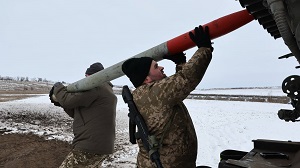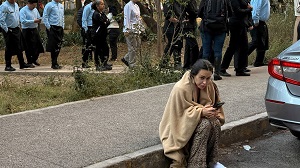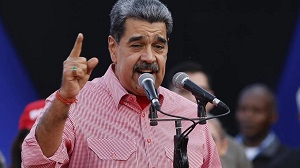Trump's main interest is ensuring pro-Iranian forces leave Syria - By Michael Jansen, The Jordan Times
Five months after US President Donald Trump announced he wanted to pull US troops out of Syria, the volatile man in the White House changed his mind. He had initially given the military until the end of the year to withdraw the 2,200-plus special forces from Syria's Raqqa and Deir Ezzor provinces and, perhaps, even those at Al Tanf base in the southeast near the Jordanian border. He also appeared ready to allow Russia, Damascus' ally, to resolve the Syrian conflict using its current strategy of combining military and politico-diplomatic means. Trump's main interest is to ensure pro-Iranian forces would leave Syria. On this Russia agrees and calls for "all foreign forces" to depart.
Trump's abrupt turn-around appears to be a result of Pentagon pressure to maintain current modest troop levels and State Department pressure to engage on the political level. The decisive push seems to have come from Secretary of State Mike Pompeo, former Central Intelligence Agency (CIA) head and Iran hawk.
His newly-appointed Syria representative, James Jeffrey, was quoted by Karen DeYoung in The Washington Post as saying, "The new policy is we are no longer pulling out by the end of the year." He said US forces would remain in order to oversee the departure of Iran's forces and the "enduring defeat" of Daesh in the east of the country. He argued that Trump is on "board [for] a more active approach". It is highly significant that he puts the "departure of Iran's forces" ahead of the "enduring defeat" of Daesh.
He said the US would launch a "major diplomatic initiative" at the UN and elsewhere and reiterated the US refusal to provide funds for reconstruction in government-controlled territory, around two-thirds of the country.
Jeffrey argued the US has not adopted a policy of "Assad must go". But he reasserted the position adopted by the Obama administration on August 18th, 2011, that "Assad has no future". He added, "... it's not our job to get rid of him". Of course, this does not mean the Trump administration will not try to do so.
Jeffrey's appointment coincided with the choice of retired US army colonel Joel Rayburn as US "special envoy for Syria". Rayburn served as an adviser to General David Petraeus, who engineered the 2007-2008 "surge" that ended sectarian bloodletting in Iraq and, for a time, drove Al Qaeda underground. It emerged in 2011-2012 to create Jabhat Al Nusra and Daesh. The latter went to war in Syria before returning to Iraq in 2014 to grab more than a third of its territory and its second largest city, Mosul.
Jeffrey is the point man for Syria. He is a retired senior foreign service veteran who served as ambassador to Iraq from August 2010 to June 2012. He was in charge during the period the US withdrew most of its troops from Iraq and closed down the occupation authority. He was also there during the reign of Shiite fundamentalist prime minister Nuri Al Maliki, whose persecution of Sunnis led to the resurgence of Al Qaeda and birth of its radical off-shoots.
Jeffrey has been an adviser to the CIA's External Advisory Board and, for five years, has been a visiting fellow at the Washington Institute for Near East Policy (WINEP). This connection is worrying. WINEP is the research arm of the American-Israel Public Affairs Committee (AIPAC), the powerful pro-Israel lobby that plays the dominant role in US policy formation towards this region. Founded in 1985, WINEP claims to be a "non-partisan organisation", which provides advice to incoming and sitting presidential administrations, as well as Congress.
WINEP was founded by Martin Indyk, an Australian who spent time at an Israeli kibbutz during the October 1973 war; an experience he dubbed "a defining moment in my life". He immigrated to the US in 1982 and worked as deputy director of research at AIPAC. He co-founded WINEP in 1985. Indyk served as adviser to several administrations, was twice US ambassaor to Israel and became Barack Obama's envoy to restart stalled peace talks.
WINEP denies a close connection with AIPAC, but the list of its board members, backers and many of its scholars proves otherwise. Among its stellar scholars is Dennis Ross, a signatory of two documents submitted by the Project for a New American Century calling for the 2003 Iraq war. He served as regional envoy of three administrations in spite of Palestinian and Arab complaints about his bias towards Israel.
Columbia University professor Rashid Khalidi called WINEP "as the most important Zionist propaganda tool in the United States". In their landmark book, The Israel Lobby and US Foreign Policy, Chicago University professor John Mearsheimer and Harvard's Academic Dean Stephen Walt wrote, "Although WINEP plays down its links to Israel and claims that it provides a 'balanced and realistic' perspective on Middle East issues, this is not the case. In fact, WINEP is funded and run by individuals who are deeply committed to advancing Israel's agenda. Many of its personnel are genuine scholars or experienced former officials, but they are hardly neutral observers on most Middle East issues and there is little diversity of views within WINEP'S ranks."
In February 2017 in testimony to the US Senate Foreign Relations Committee while associated with WINEP, Jeffrey, quoted on the WINEP website, called for an enduring effort that ensures continuing US engagement in the region by maintaining its Kurdish, Turkish and Iraqi relationships, counters Iran and manages the Russians. He put "Iranian expansionist activity" on a par with defeating Daesh.
To prevent the Syrian government from achieving "a total victory over the opposition", he said, "the United States should support the Turkish zone in northern Syria, the Kurds' Rojava and Afrin enclaves, and a 'free zone' around Raqqa, including with some temporary US military training and liaison detachments inside Syria". He favoured keeping the "option of arming" the opposition Free Syrian Army (FSA). His objective was to split Russia "off from Iran and Syria."
Of course, events have moved on since he testified but it is important to note that he argued the US should prevent the Syrian government from regaining all the country's territory. This would be accomplished by backing Turkish occupation in the north and Kurdish control along the Syrian-Turkish frontier and in the east. Keeping the FSA in play would prolong the Syrian crisis. Such a policy would be very dangerous and destabilising, a recipe for disaster.
The only way to resolve the Syrian conflict, effect the withdrawal of forces loyal to Iran and reduce Russia's presence in Syria is to restore government control of its entire territory, pressure Turkey to pull out of the enclaves it has seized illegally and ensure the Kurds reach a deal with Damascus.
By contrast, Jeffrey urged the US to "preserve Iraqi unity and independence". This will not happen if Syria is divided along the lines Jeffrey suggested.




